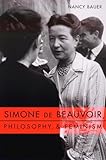Simone de Beauvoir, Philosophy, and Feminism / Nancy Bauer.
Material type: TextSeries: Gender and Culture SeriesPublisher: New York, NY : Columbia University Press, [2001]Copyright date: ©2001Description: 1 online resource (288 p.)Content type:
TextSeries: Gender and Culture SeriesPublisher: New York, NY : Columbia University Press, [2001]Copyright date: ©2001Description: 1 online resource (288 p.)Content type: - 9780231116640
- 9780231529174
- 305.42 305.42/01 305.4201
- HQ1190 .B385 2012
- online - DeGruyter
- Issued also in print.
| Item type | Current library | Call number | URL | Status | Notes | Barcode | |
|---|---|---|---|---|---|---|---|
 eBook
eBook
|
Biblioteca "Angelicum" Pont. Univ. S.Tommaso d'Aquino Nuvola online | online - DeGruyter (Browse shelf(Opens below)) | Online access | Not for loan (Accesso limitato) | Accesso per gli utenti autorizzati / Access for authorized users | (dgr)9780231529174 |
Frontmatter -- CONTENTS -- ACKNOWLEDGMENTS -- Introduction: Recounting Woman -- CHAPTER 1. Is Feminist Philosophy a Contradiction in Terms? First Philosophy, The Second Sex, and the Third Wave -- CHAPTER 2. I Am a Woman, Therefrom I Think: The Second Sex and the Meditations -- CHAPTER 3. The Truth of Self-Certainty: A Rendering of Hegel's Master-Slave Dialectic -- CHAPTER 4. The Conditions of Hell: Sartre on Hegel -- CHAPTER 5. Reading Beauvoir Reading Hegel: Pyrrhus et Cinéas and The Ethics of Ambiguity -- CHAPTER 6. The Second Sex and the Master-Slave Dialectic -- CHAPTER 7. The Struggle for Self in The Second Sex -- NOTES -- REFERENCES CITED -- INDEX
restricted access online access with authorization star
http://purl.org/coar/access_right/c_16ec
In the introduction to The Second Sex, Simone de Beauvoir notes that "a man never begins by establishing himself as an individual of a certain sex: his being a man poses no problem." Nancy Bauer begins her book by asking: "Then what kind of a problem does being a woman pose?" Bauer's aim is to show that in answering this question The Second Sex dramatizes the extent to which being a woman poses a philosophical problem. This book is a call for philosophers as well as feminists to turn, or return to, The Second Sex. Bauer shows that Beauvoir's magnum opus, written a quarter-century before the development of contemporary feminist philosophy, constitutes a meditation on the relationship between women and philosophy that remains profoundly undervalued. She argues that the extraordinary effect The Second Sex has had on women's lives, then and now, can be traced to Beauvoir's discovery of a new way to philosophize-a way grounded in her identity as a woman. In offering a new interpretation of The Second Sex, Bauer shows how philosophy can be politically productive for women while remaining genuinely philosophical.
Issued also in print.
Mode of access: Internet via World Wide Web.
In English.
Description based on online resource; title from PDF title page (publisher's Web site, viewed 02. Mrz 2022)


